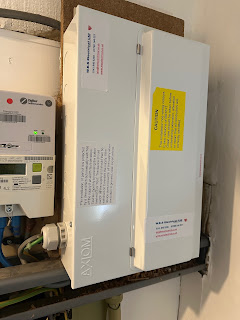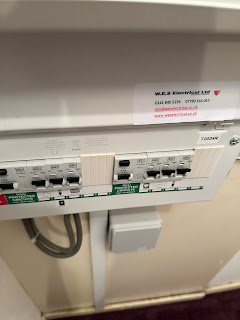When the lights go out unexpectedly or a burning smell creeps from your fuse box in the dead of night, there’s no time to waste searching endlessly online. You need an emergency electrician in West End Glasgow—and you need them fast.
Glasgow’s West End is known for its vibrant community, stunning tenements, and bustling businesses. But whether you're living in a sandstone flat in Partick, running a boutique in Byres Road, or managing a rental property in Hillhead, electrical emergencies can strike at any time.
This blog covers everything you need to know about emergency electricians in West End Glasgow—what to expect, what services they provide, and who to call when you need help now. We’ll also include trusted recommendations to ensure your safety and peace of mind.
What is Considered an Electrical Emergency Westend Glasgow?
Before picking up the phone, it’s essential to understand what actually counts as an emergency. Electrical faults can be dangerous and sometimes life-threatening if ignored. Here are common examples:
⚡ Power Outage (Not a Grid Issue)
If your neighbours still have power but you don’t, the problem likely lies within your property. This could be a fault in the consumer unit or internal wiring.
🔥 Burning Smell or Sparks
This is one of the most dangerous signs of an electrical fault. If you smell burning near sockets, lights, or your fuse board, switch off the power immediately and call an emergency electrician.
⚠️ Exposed Wires or Water Damage
Accidentally drilled into a cable? Water leaking near your consumer unit? These scenarios pose a major risk of electrocution and require urgent attention.
🛑 RCD Tripping Repeatedly
Your Residual Current Device (RCD) is there for your safety. If it keeps tripping, especially during the night, it’s likely a sign of a serious fault somewhere in your electrical system.
Why You Need a Local Emergency Electrician in West End Glasgow
Electrical emergencies don’t wait for 9–5. You want someone local, experienced, and available 24/7—and preferably based in or near the West End for fast response times.
Here’s why choosing a local electrician over a big national chain makes all the difference:
Faster Response: Local electricians can usually be at your door within 1 hour.
Better Customer Service: Local firms rely heavily on word-of-mouth and reputation.
Local Knowledge: West End tenements, Victorian flats, and older buildings often have unique wiring systems. A local expert will know what to expect.
Common Emergency Electrical Services in the West End
Here are just some of the callouts a typical 24-hour electrician in Glasgow’s West End may respond to:
1. Consumer Unit/Fuse Box Faults
Outdated or overloaded consumer units are a common issue in West End properties. If you see scorch marks, smell burning, or hear buzzing noises, get it checked immediately.
2. Faulty Sockets or Switches
Broken sockets can be more than an inconvenience. They could be hiding damaged wires, posing a fire or electrocution risk.
3. Emergency Lighting Failures
Shops, cafes, HMOs and short-term lets must have compliant emergency lighting systems. If they fail, it could affect your insurance or even lead to prosecution.
4. Tripping Circuits
A sudden blackout in one part of your home or business often means something has tripped the fuse. But repeated tripping can mean underlying faults that need urgent diagnosis.
5. Electric Showers and Heating Issues
Losing your electric shower or heating on a cold Glasgow night is miserable. A local emergency electrician can often fix or isolate the issue quickly to restore comfort and safety.
How Much Does an Emergency Electrician Cost in Glasgow’s West End?
Costs will vary depending on the time of day, the complexity of the issue, and whether parts are required. But here’s a rough guide for emergency callouts in West End Glasgow:
| Time of Day | Typical Callout Fee | Hourly Rate |
|---|---|---|
| Weekdays (9–5) | £50–£75 | £40–£60/hr |
| Evenings (5–10pm) | £75–£100 | £60–£80/hr |
| Nights/Weekends | £100–£150+ | £70–£100/hr |
🚨 Tip: Always ask for a quote or at least a rough estimate before the electrician arrives.
Signs of a Trustworthy Emergency Electrician Hyndland
When stress levels are high, and you're dealing with a sparking socket or cold flat, it’s tempting to call the first number you see online. But not all electricians are equal.
Here’s what to look for:
Fully Qualified & NICEIC Registered
Clear Pricing with no hidden fees
Fast Response Times
Positive Google Reviews
Emergency Availability (24/7)
Public Liability Insurance
Recommended Emergency Electricians in West End Glasgow
We’ve done the legwork for you. If you need an emergency electrician in Glasgow West End, here are two highly trusted local providers:
🔌 Wes Electrical – Based in Renfrew, Serving West End
📞 0141 840 5236
Services: Emergency callouts, fuse board upgrades, socket repairs, EICRs, landlord safety checks
Why Choose Them: Fast, honest, and experienced with West End buildings. Many locals use them for both emergencies and planned works.
⭐ Google Rating: ★★★★★
🔧 Certificates 4 Landlords – Ideal for Landlords & Agents
🌐 www.certificates4landlords.co.uk
Services: EICRs, EPC certificates in Glasgow, emergency electrical repairs, smoke alarm compliance
Why Choose Them: One-stop shop for landlord certificates in Glasgow. If you have tenants without power, they’ll get it sorted quickly and handle the compliance too.
What To Do While Waiting for an Emergency Electrician West End Glasgow
Your safety comes first. Here's how to stay safe while help is on the way:
Turn Off the Power at the consumer unit if you suspect a fire hazard.
Keep Away From Water – If water is near a socket or fuse board, do not touch anything.
Avoid Using Appliances that could be faulty.
Ventilate the Room if there’s a burning smell.
Call Emergency Services if you see flames or smoke.
How to Prevent Future Electrical Emergencies Hyndland
Prevention is cheaper and safer than dealing with late-night disasters. Here’s how to minimise the risk:
✅ Book Regular EICR Testing
An EICR (Electrical Installation Condition Report) is essential every 5 years for homeowners and every 3 years (or change of tenancy) for landlords. It checks for underlying issues before they become emergencies.
If you're a landlord or property manager in the West End, make sure your properties are up to date with EICRs and smoke alarm legislation.
✅ Upgrade Old Fuse Boxes
Still using an old-style fuse board with rewireable fuses? Upgrading to a modern consumer unit with RCD protection could save your life—and help prevent costly callouts.
✅ Avoid Overloading Sockets
Using too many high-draw appliances on a single socket (especially heaters or dryers) is one of the top causes of overheating.
Why Electrical Safety is a Priority in West End Glasgow
With its mix of old Victorian homes, newer developments, and a high student population, West End Glasgow has some of the most diverse electrical needs in the city.
Older properties often hide dangerous wiring from decades ago. And rental properties (especially HMOs) are legally required to meet strict electrical safety standards. For landlords, this means staying compliant with:
EICR Testing
Smoke & Heat Alarm Installation (Interlinked)
PAT Testing for Appliances
EPC Certificates for Rentals
Ignoring these can result in fines or worse—putting tenants’ lives at risk.
Final Thoughts: Don’t Wait. Call an Emergency Electrician Now
If you're currently dealing with a dangerous electrical issue—or even suspect one—do not delay. Emergencies don’t fix themselves, and waiting can turn a fixable fault into a fire.
Whether you’re a homeowner, landlord, tenant, or business owner in the West End, knowing who to call in an emergency is vital. Save these numbers, bookmark this post, and share it with others in the area.
✅ Need Help Right Now?
Call Wes Electrical on 0141 840 5236 – fast, trusted and local.
Or visit Certificates 4 Landlords for landlord emergencies, EICRs, and urgent compliance support.
Frequently Asked Questions
Q: Are emergency electricians available 24/7 in West End Glasgow?
Yes. Reputable local firms like Wes Electrical offer true 24-hour service across Glasgow West End.
Q: How quickly can someone arrive?
In most cases, a qualified electrician can be at your property within 1 hour.
Q: Can an electrician fix the issue during the callout?
Most faults can be isolated or repaired during the visit. For major works, they’ll make the area safe and schedule follow-up repairs.
Q: Is it worth having an EICR even if I’m not a landlord?
Absolutely. An EICR can detect fire risks, overloaded circuits, and other hidden dangers.











